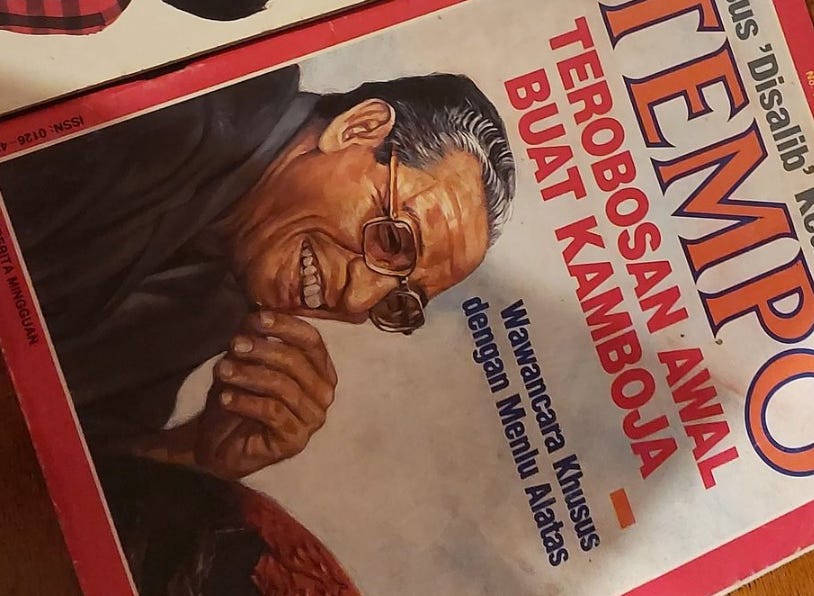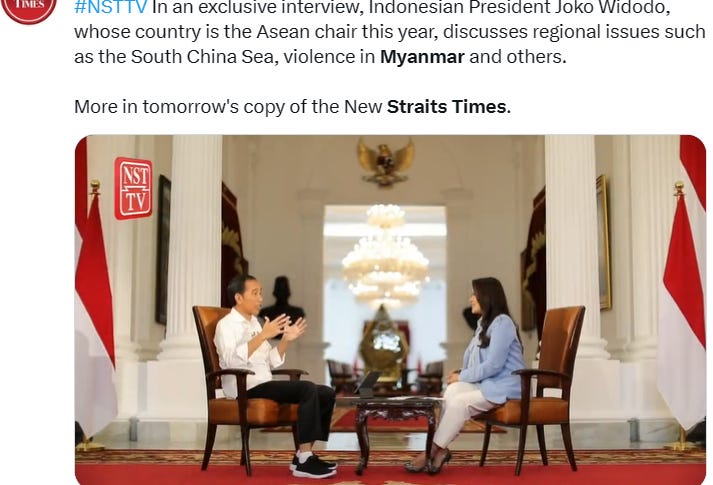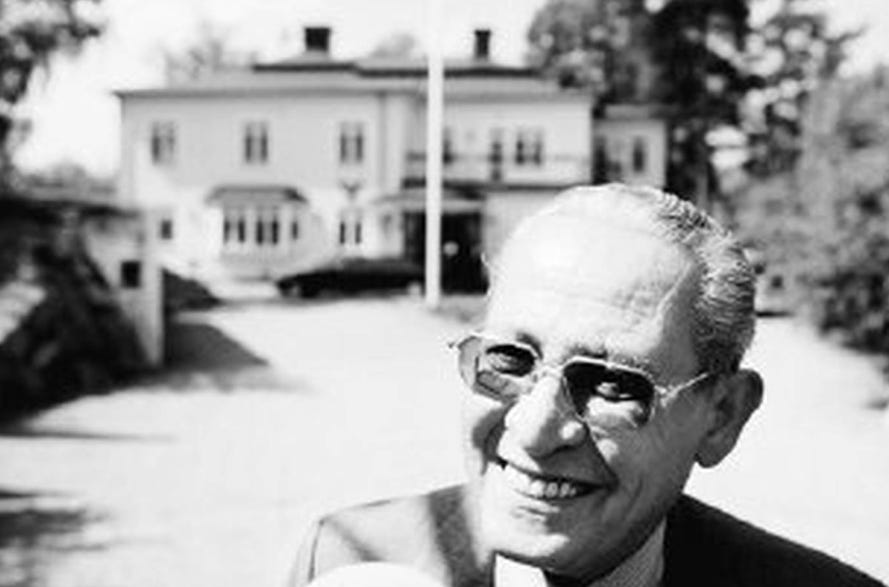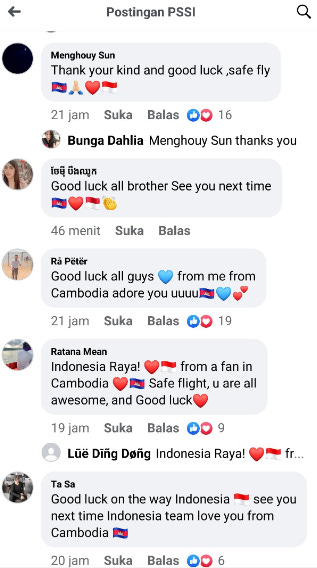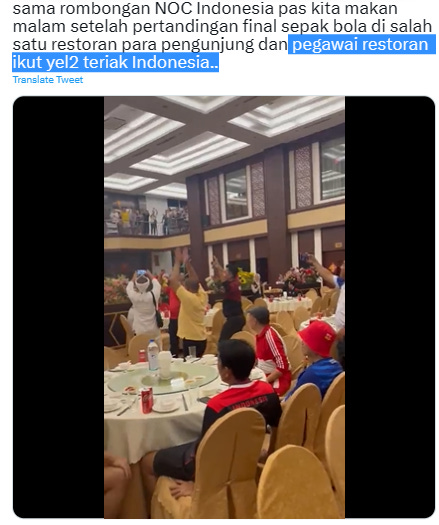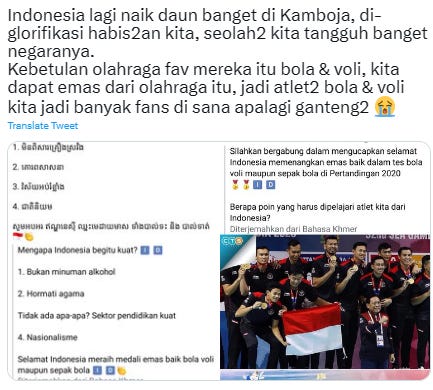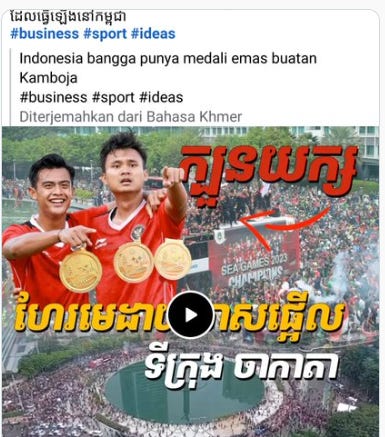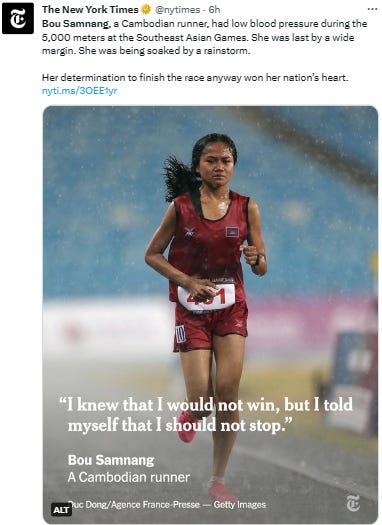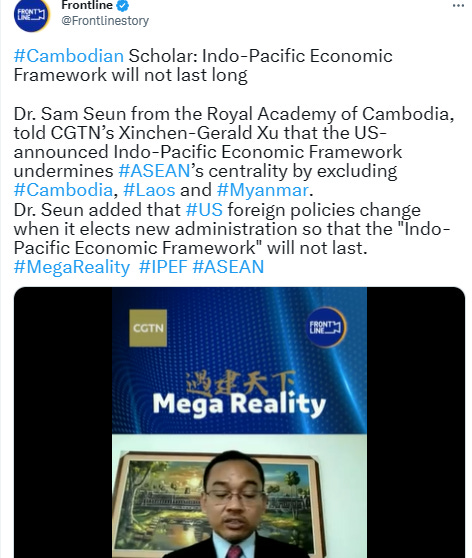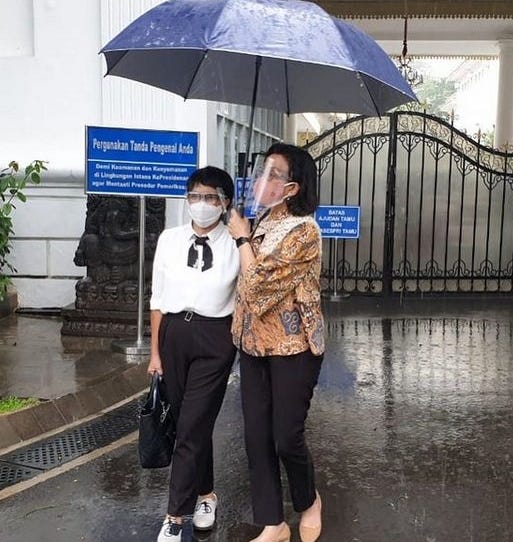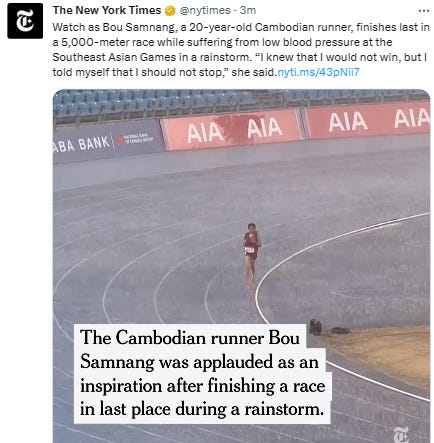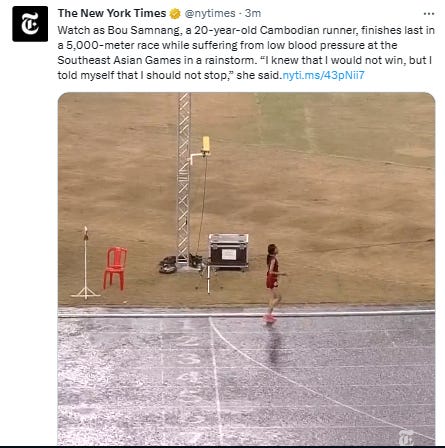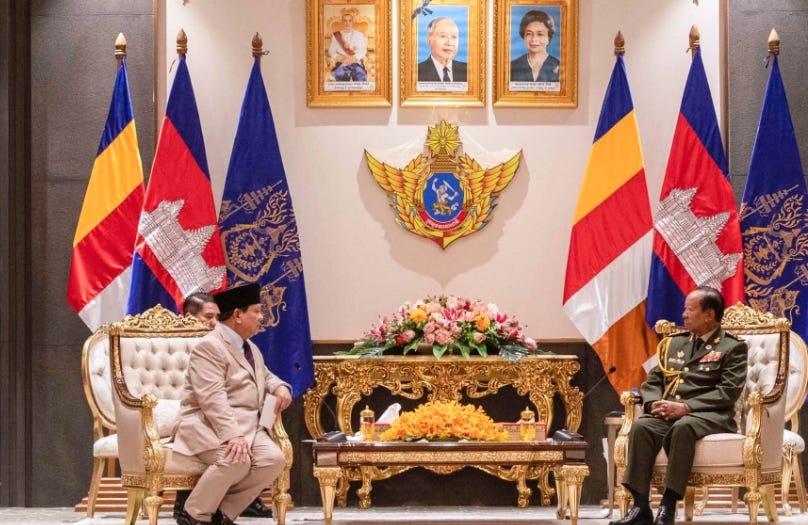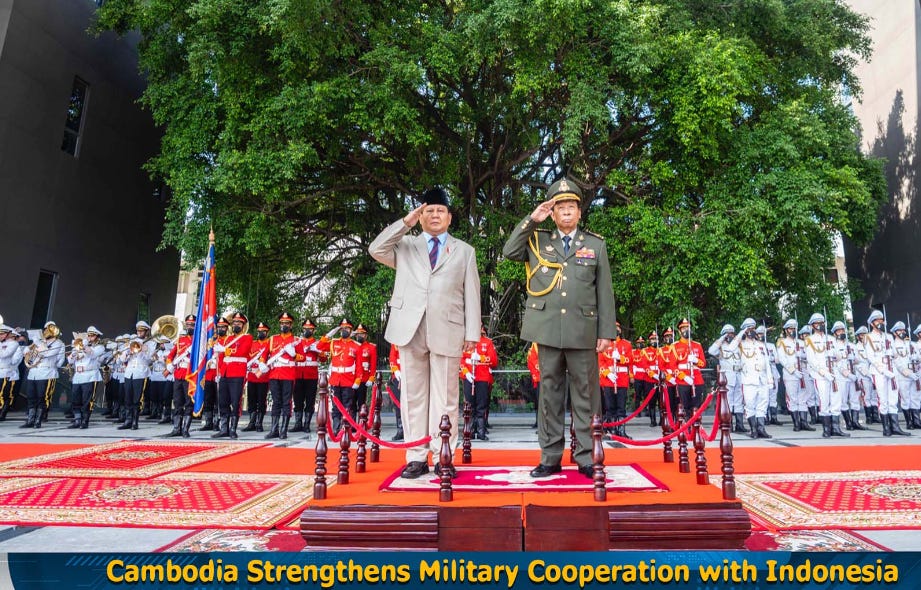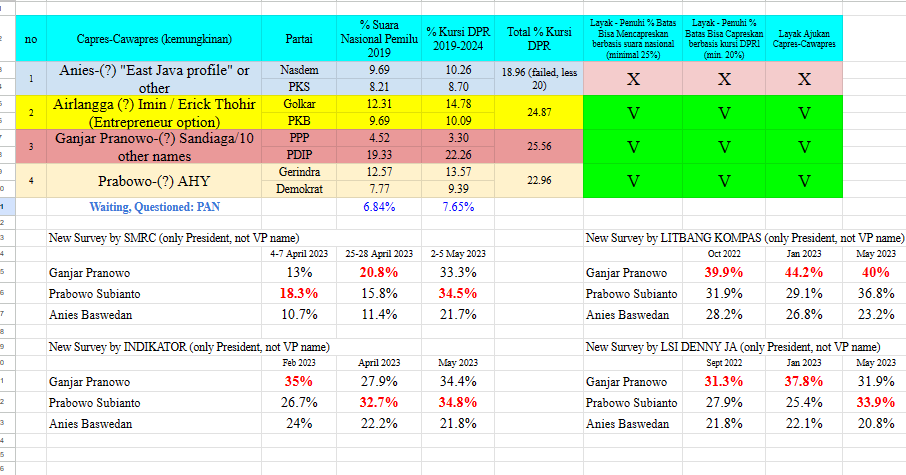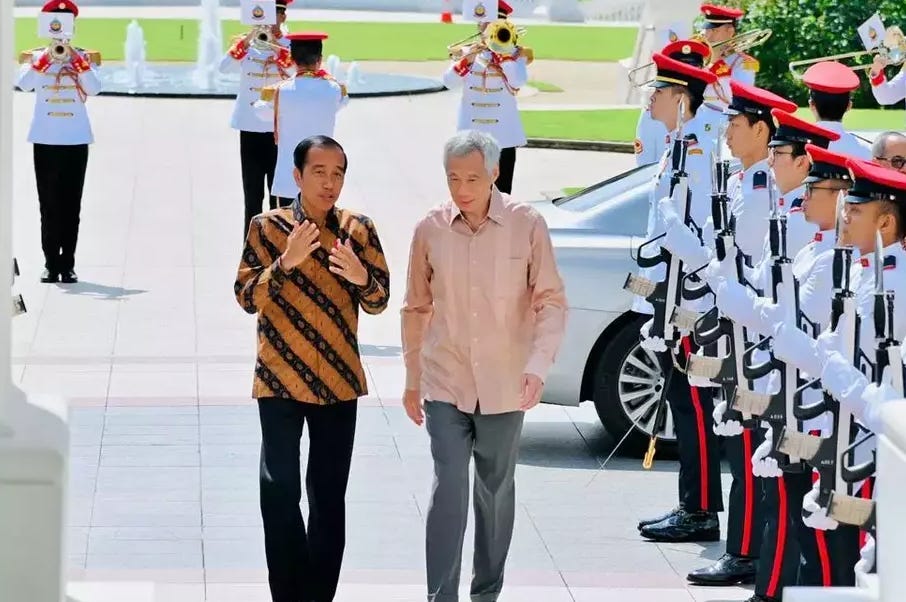Unexpected That Cambodian Never Ever Forget “Help” from Indonesian 3 Decades Ago: Ali Alatas, Prabowo, and Indomie
“WE LOVE INDOMIE TOO”, a Cambodian uploaded her stories Instagram, about the Opening Ceremony of 32nd SEA Games in Cambodia amid showing INDOMIE–maybe the best noodles in the universe, sold in Cambodia. The other day, a Cambodian said that Indonesian athletes are " really humble" despite winning a gold medal. Coincidentally, Cambodia loves football and volleyball, and in the SEA Games this year, Indonesia wins (both) Football & Volleyball.
(Title in TEMPO Magazine: A first step solution to Cambodia, an exclusive interview with Ali Alatas)
To imagine how proud Cambodian is as host of SA Games, we in Indonesia may still be waiting until (we) are the host of the Olympics – a gargantuan sport event which Indonesia must allow Israel. Last time, the FIFA World Cup U20 moved from Indonesia to Argentina because Indonesia insisted on saying no for Israel (support Palestine) although Israel qualified. Olympic 2032 is already (decided/goes to) Brisbane so for the Asia Pacific area, if willing to be host, maybe waiting (for candidacy, at least) 2044 or 2048 because another region get a chance for (Olympics) 2036 and 2040.
Indonesia hosted many meetings to bring Cambodia’s warring parties to negotiation tables in Jakarta, Bogor in West Java and other places. The Cambodian leader likely still remembers the Jakarta Informal Meeting (JIM) I and II in 1988 and 1989, respectively, and the earlier “cocktail party”. Other countries also tried to help the Cambodian people such as Australia and Japan. Vietnam invaded Cambodia on Dec. 25, 1978, to topple the Chinese-backed brutal Khmer Rouge regime and put Hun Sen in charge of its surrogate government in Pnom Penh. Hun Sen himself, a former Khmer Rouge officer who fled to Vietnam after internal conflict, became the enemy of the Pol Pot regime, which had butchered hundreds of thousands of people in a time often remembered as the Killing Fields. The Paris Peace Conference was cohosted by Indonesia and France, officially ending the Cambodia-Vietnam war. To ensure the implementation of the agreement, the United Nations Transitional Authority in Cambodia (UNTAC) was established in 1992. Right now, there is the same call for Indonesia to act as an honest peace and democracy broker for the country.
Jan 17th, 2023, two streets in Phnom Penh are to named after former Indonesian president Sukarno and foreign minister Ali Alatas to commemorate their contributions to modern Cambodia.
Sukarno visited Cambodia in the 1950s and 60s, not long after the Kingdom gained independence from France, while Alatas co-chaired a conference on Cambodia in the French capital prior to the 1991 Paris Peace Agreements.
Outgoing Indonesian ambassador Sudirman Haseng paid Phnom Penh governor Khuong Sreng a courtesy visit on January 17, before inspecting the locations of the two roads set to be named Jalan Soekarno and Jalan Ali Alatas.
Sreng told the delegation that the Kingdom’s friendship with Indonesia has contributed to the development of modern Cambodia, with Prime Minister Hun Sen deciding to name the streets after the two leaders as an expression of gratitude.
“The two streets will be named Jalan Soekarno and Jalan Ali Alatas to express gratitude to the leadership of the Republic of Indonesia, which has contributed greatly to Cambodia’s development,” he said.
Sudirman expressed gratitude at the streets being named after the former Indonesian statesmen and praised the rapid development of Phnom Penh.
The two roads will connect National Road 6 to Win-Win Boulevard in Chroy Changvar district and are expected to improve traffic conditions in the capital, especially when Cambodia hosts the 32nd Southeast Asian (SEA) Games and the 12th Para Games in May this year.
Kin Phea, director of the International Relations Institute at the Royal Academy of Cambodia, said the two countries’ relationship had deepened since diplomatic ties were first established in 1957, when Cambodia was led by the late King Father Norodom Sihanouk and Indonesia by Sukarno.
Cambodia and Indonesia had enjoyed good relations until 1975, when diplomatic ties were severed by the genocidal Khmer Rouge regime, and it was not until 1992, after the Paris Peace Accords, that the two countries re-established official relations.
“Since 1992, after the re-establishment of diplomatic ties, Cambodia and Indonesia have enjoyed a good relationship, which we can see from the mutual interests in economics, politics, tourism and education.
“Within the framework of bilateral relations, the two countries have set up mechanisms to show goodwill and commitment to strengthen mutual ties in the areas of politics, economics and trade, though at present bilateral trade volume remains limited,” Phea said.
President Jokowi should be firm in Indonesia’s fundamental, consistent commitment to the people in ASEAN, though he can be flexible regarding technicalities, with (now) focus about Myanmar.
As an IR graduate, I heard for the first time ever “Pejambon Maneuver” because of Indonesia's willingness to help Cambodia. Pejambon is a district in which the Indonesia Foreign Ministry building is located. So, peace in Cambodia, most of all, because of the role of (Former Minister) late Ali Alatas.
Ali Alatas, who has died aged 76, was one of Indonesia's most widely respected foreign ministers. A charismatic and urbane man - known affectionately as "Pak Ali" - he was tipped to become the United Nations secretary general in the 1990s. But his boss, the Indonesian dictator Suharto, is said to have opposed the move, fearing it would shine a spotlight on the country's questionable human rights record in East Timor.
Alatas was born in Jakarta. He graduated from the Academy for the Indonesian Foreign Service in 1954 and the University of Indonesia's law faculty two years later. A career diplomat, he was stationed in various embassies of Indonesia, including those in Bangkok and Washington DC, and he twice served as Indonesia's ambassador to the UN, in Geneva from 1975 to 1978 and in New York between 1982 and 1988. That year, in the final decade of Suharto's 32-year reign, he became Indonesia's foreign minister, serving another year under the dictator's successor, BJ Habibie.
Successive Indonesian presidents, including the current incumbent, Susilo Bambang Yudhoyono, valued his long experience and unflappable nature. Each ensured that he stayed around as a foreign adviser. Most recently, he was instrumental in seeing that the 10-member Association of South East Asian Nations (Asean) enshrined the values of human rights and democracy in a charter that came into force this week. He was also a board member of the Brussels-based International Crisis Group. Alatas was in recent years a UN special envoy tasked with drafting a report on security, development and human rights.
But his soaring diplomatic career was always tarnished by Indonesia's abuses in East Timor, after it invaded and occupied the former Portuguese colony once it had achieved independence in 1975. Alatas's diplomatic skills were tested to the full by the Suharto regime's often brutal repression in East Timor, and elsewhere. Alatas admitted that the 1991 massacre of pro-independence demonstrators by Indonesian troops at the Santa Cruz cemetery in the capital, Dili, in which hundreds of civilians died, was a "turning point". Even nations that had supported Indonesia were "shocked" by the carnage, which was captured on film by Max Stahl, a British journalist and documentary maker. It led to Indonesia's isolation by the west for years.
International outrage over the deaths may have cost Alatas the top UN job, for which he was in the running in the late 1990s. Suharto reportedly vetoed his candidacy as he believed the role would have highlighted such abuses.
After his long stint as foreign minister under Suharto, who was swept from power in May 1998 by mass street protests, he served just one year as Habibie's senior diplomat. But it was an uncomfortable time; Habibie failed to consult him, notably on the decision to stage a referendum on East Timor that ended Jakarta's 24-year occupation in 1999. The mayhem that ensued, when more than 1,000 East Timorese died as Jakarta-backed militias went on the rampage, were a further stain on Alatas.
In 2001, Alatas compiled a book, A Voice for a Just Peace that contained a selection of his speeches with some commentary, though only one passage on East Timor was included. It also highlighted Indonesia's desire for economic and social justice on a global scale, demanding an end to nuclear testing and the reform of the UN to end superpower domination. Indonesia's wish to discuss "moral" alternatives on the world stage was, however, blighted by East Timor.
Yet five years later, Alatas' ground-breaking work, The Pebble in the Shoe: The Diplomatic Struggle for East Timor, helped stir a wider debate about the occupation and forced Indonesia to start to re-examine its rule there.
Some successes helped to underpin Alatas's reputation as an international statesman. His greatest triumph was his work with the Cambodian prime minister Hun Sen, who had been appointed by the invading Vietnamese in 1978; Alatas brokered the historic 1991 peace settlement at the Paris International Conference to end the war with the Khmer Rouge, though he had to share some of the glory with France, which joined the negotiations late in the day. Less successfully he also battled hard with Asean neighbour Burma for the release of opposition leader, Aung San Suu Kyi, who has spent 13 of the last 19 years under house arrest.
Noninterference does not mean we have no right to help neighbors in trouble. The obsolete, rigid adherence to the principle is tantamount to accepting violence and human rights abuses by our neighbors So, should Indonesia treat Hun Sen’s enemies as our enemies, too? As long as his opponents use peaceful and orderly ways in expressing political aspirations, Indonesia, as ASEAN’s largest and most democratic member, should always seek constructive engagements to promoting democracy and basic human rights. It does not mean we are perfect. Foreign Minister Retno LP Marsudi should convey to the Cambodian people, preferably in front of President Jokowi, that Indonesia is ready to offer our help once more to ensure democracy will prevail in Cambodia — while also respecting its sovereignty.
Another role (and Cambodian never forget) is from Prabowo Subianto.
June 21st, 2022 (11 months ago), Prabowo paid a visit to the special forces command of the Kingdom of Cambodia Armed Forces in Phnom Penh. In this opportunity, the Minister was reunited with a number of military personnel he once mentored at the Indonesian Army special forces (Kopassus).
“Today I am proud to have been welcomed at the Special Forces Command of the Cambodian Army. I am certain that this unit will continue to become a reliable and superior force that will defend the Cambodian nation and people,” said Subianto on June 21, Antaranews reported.
Cambodia’s special forces commander and deputy army commander Lieutenant General Chab Peakdey was present to welcome the Minister in person, who is one of Prabowo’s proteges.
Prabowo mentioned that Indonesia had always considered Cambodia as a close relative with long historical ties. Bilateral cooperation between the two countries, he said, has always been well developed from time to time.
Apart from Chab, there are also a number of former Prabowo proteges who currently assume strategic positions in the Cambodian military, including Lt. Gen. Yib Koy who now serves as Commander of the Education Center for the Security Forces (Danpusdik Paspam) of the Prime Minister (PM) of Cambodia, Major General (Mayjen) Sin. Ra, who served as Commander of Detachment 241 Paspam PM Cambodia, and Lt. Gen. Pol. Chin Sary, who served as Director General (Dirjen) of the Cambodia National Police.
DPM Tea Banh, wrote on his Facebook page, "During the current official visit of His Excellency PRABOWO Subianto, Minister of Defense of Indonesia to Cambodia, the relationship between the two Ministries of Defense and Cooperation of Cambodia and Indonesia will be further strengthened to further promote strengthening military capabilities, including sending Cambodian trainees for training in Indonesia, sending Indonesian military personnel to train trainees in Cambodia, exchanging visits, attending peacekeeping exercises and providing military equipment to the Royal Cambodian Armed Forces."
Prabowo Subianto Djojohadikusumo, born 17 October 1951, is an Indonesian businessman and former lieutenant general who is currently the Minister of Defense of the Republic of Indonesia. He is listed by The Diplomat as a member of Indonesian President Joko Widodo's cabinet, who consider the Asia-Pacific region as currently facing increasing geopolitical tensions in the China-US rivalry, a game which no one will win. Indonesia has expressed that it will seek a stronger partnership with both countries. Currently Prabowo leads in multiple prominent survey-polls of Presidential Election 2024.
(Promoting to more engage in Substack) Seamless to listen to your favorite podcasts on Substack. You can buy a better headset to listen to a podcast here (GST DE352306207). Listeners on Apple Podcasts, Spotify, Overcast, or Pocket Casts simultaneously. podcasting can transform more of a conversation. Invite listeners to weigh in on episodes directly with you and with each other through discussion threads. At Substack, the process is to build with writers. Podcasts are an amazing feature of the Substack. I wish it had a feature to read the words we have written down without us having to do the speaking.




